3 Las Vegas judges never say no to wiretaps

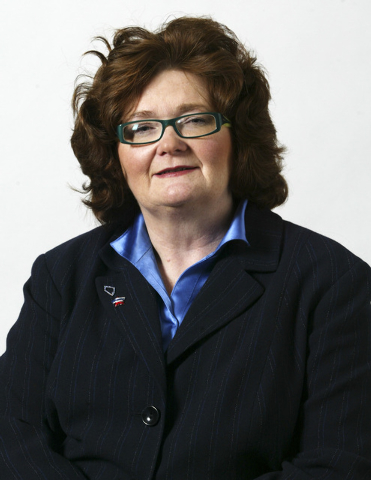

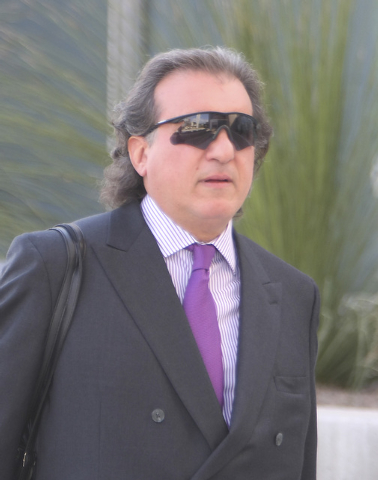

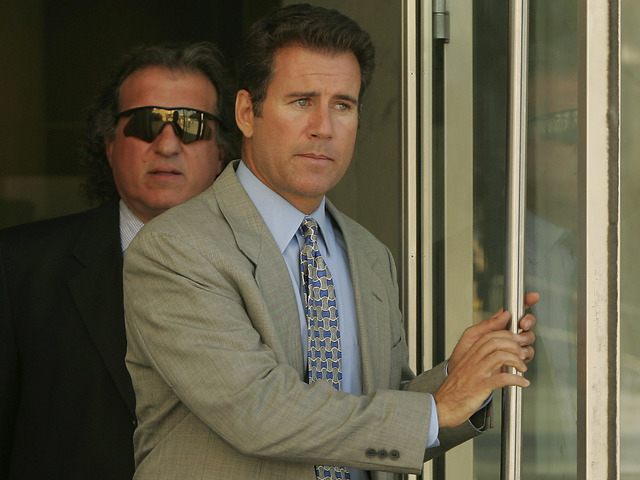
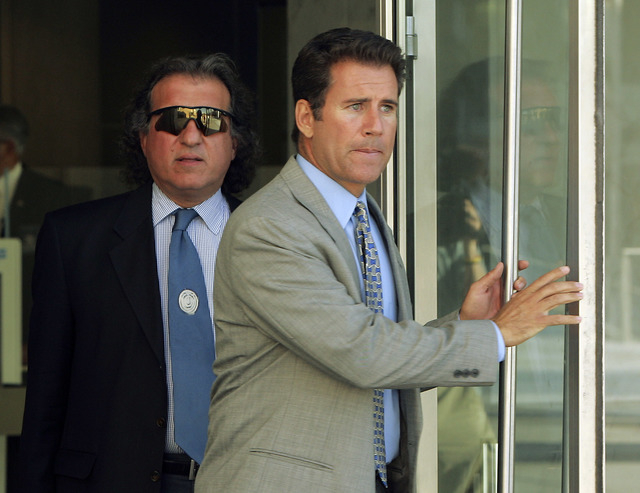
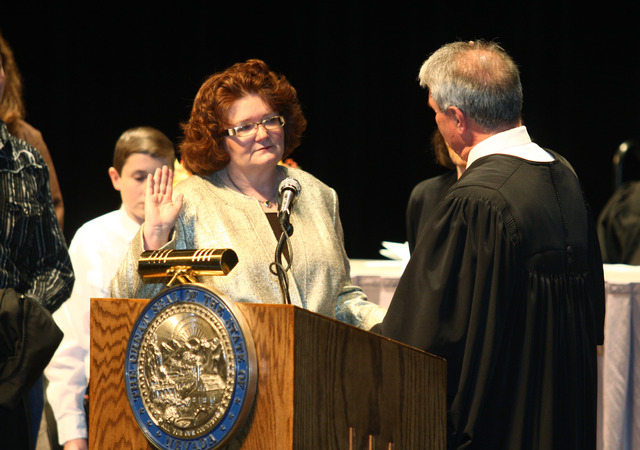
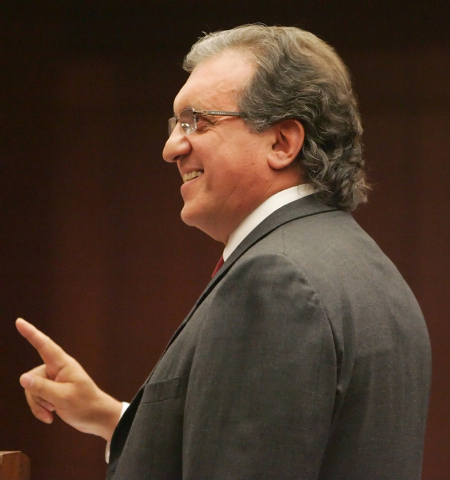
When it comes to seeking approval for a wiretap, Nevada law enforcement agents could have their pick of any number of well-qualified jurists in the state.
But data collected by the Administrative Office of U.S. Courts shows law enforcement agencies overwhelmingly ask just three Clark County judges who primarily handle civil cases to review and approve the intrusive investigative technique in criminal cases.
A recent study by the Pew Research Center found that the Silver State led the nation with 38 phone wiretaps per 500,000 people in 2013, for a total of 187 wiretaps filed under seal.
Of the 187 Clark County wiretaps, just 11 were signed by judges who regularly hear criminal cases. The rest were signed by civil judges.
While Nevada law allows any district judge anywhere in the state to approve a wiretap warrant, three Clark County district judges — Nancy Allf, Ron Israel and Gloria Sturman — were called on to sign more than 75 percent of the wiretaps in 2013.
Judges and prosecutors say the judges are chosen randomly and more for the convenience of secretaries who handle the paperwork than their willingness to authorize wiretaps.
Veteran defense lawyer Dominic Gentile, however, calls the convenience argument a bit too convenient.
“I think it’s deliberate,” he said.
WIRETAPS OBSCURED
Gentile and his team at the firm Gordon Silver contend that law enforcement agencies are actually using a police technique called a “handoff” to keep wiretaps secret, Gentile said.
An officer listening to a wiretap will insulate himself by telling another officer he received a tip. The tip could be that if another officer pulls over a certain car with a certain license plate, driven by a certain person at a certain time, 20 pounds of drugs will be found, Gentile explained. The arresting officer will write in his report that he got a tip from another officer. When that information is turned over to a defense lawyer in pre-trail discovery, there will be no mention of a wiretap.
Sometimes accounts of arrests will say an officer saw an erratic driver and pulled the vehicle over. When the driver acted suspiciously a drug-sniffing dog was called, leading to the discovery of drugs. The arrest reports will never mention a wiretap was used, Gentile said, because the person listening to the wiretap had nothing to do with the actual arrest.
Gentile said he believes detectives seek wiretap approvals from civil judges such as Sturman because they’re unlikely to ever hear a criminal case. A judge presiding over a criminal case who knows of a wiretap would ensure the information is turned over to the defense during discovery, he said.
If the defense doesn’t know about the wiretap, it cannot challenge the warrant as a violation of the defendant’s civil rights.
Keeping wiretap information secret can benefit police further because the defendants would never know police were listening and might talk about other things officers would find useful.
Evidence that Nevada defense lawyers are unaware of most wiretaps can be found in the small number of motions to suppress evidence collected through a wiretap, Gentile said.
Federal court data for 2012 show 39 arrests based on 241 approved wiretaps, with only one defense motion to suppress wiretap evidence.
Gentile said if defense lawyers are aware of a wiretap, it’s their responsibility to challenge it. The 2012 number “tells me the defense lawyers were not told of the wiretaps. If you (a defense lawyer) know there’s one and you have not filed a motion to suppress, then you have not provided effective assistance of counsel to your client,” Gentile said.
But Chief Deputy District Attorney Christopher Laurent said there are other explanations for the lack of challenges.
If a wiretap is challenged and found to be lawful, the defendant’s hand in negotiating a plea deal could be weakened, resulting in a stiffer sentence, Laurent said, stressing that “I’m just guessing, just like Mr. Gentile is guessing.”
Laurent said prosecutors don’t hide wiretaps from defendants.
“I don’t have any recollection of not providing wiretap information when it’s part of a case,” Laurent said.
Anyone who is the subject of a wiretap must be notified within 90 days, though investigators can request a 90-day extension for the wiretap investigation. Laurent said “everyone gets informed eventually” if authorities can track them down.
HOW HANDOFFS EVOLVED
Police have used handoffs for decades, however.
According to the Los Angeles public defender’s office, prosecutors there developed the method in 1985 and told officers to find another way to explain the arrest of a suspect to avoid disclosing a wiretap.
The practice was widespread in the 1990s until a California judge ruled in 2000 that defendants who were never told their phones were being tapped could get their convictions overturned.
California legislators soon changed the law, and now prosecutors must disclose a wiretap in every case before the defendant enters a plea.
In Nevada, wiretap applications have been on a steady rise for years, federal data shows.
Nevada saw wiretap applications jump from 56 in 2009 and 43 in 2010 to 91 in 2011, 244 in 2012 and 187 in 2013.
Of those 39 people arrested in 2012, 11 were convicted. In 2013, 134 people were arrested and 78 were convicted.
The cost for the wiretaps, including the staff time needed to listen, ran nearly $16 million over the five-year period, with law enforcement spending $8.37 million in 2012 and $4.18 million in 2013.
In contrast, from 2004 through 2007 Clark County judges authorized a total of only 31 wiretaps.
Most of the cases involve drug crimes, and they seldom go to trial, Gentile said, as defendants will take a deal and plead guilty, never knowing that a wiretap was used to make the case.
Laurent said police often do receive tips that don’t involve wiretaps from other agencies or jurisdictions. Someone stopped by police must have committed some sort of traffic violation, and any subsequent search must be done constitutionally, he said.
“The tip itself doesn’t justify the stop. Everything must be constitutional,” Laurent said.
And those notices to people being tapped?
Even after someone is stopped, the wiretap could remain sealed if authorities are still investigating the case or other people are being targeted.
A MATTER OF PROXIMITY?
Allf and Israel declined to comment, but Sturman said she believes the reason she is often chosen to review wiretap warrant requests is simple: Proximity.
Sturman — who with Allf and Israel were civil lawyers before being elected to newly created judgeships in 2010 — said her office is on the same floor as the district attorney’s office in the Regional Justice Center. That makes it easier to pop over for a warrant approval.
Prosecutors also might rely on a small group of judges because the judges are already familiar with wiretaps and the kind of cases where they’re used, she said.
Still, Laurent, who has handled many drug cases, said there’s “no rhyme or reason” in judge selection. He said he’s not told which judge will be asked to approve a wiretap before the judge sees the case.
A secretary from the district attorney’s office just calls around to find a judge who isn’t busy, he said, though he also agreed that so many cases might go to the three civil judges because of their convenient third-floor location. The prosecutor’s secretaries might find certain judges easier to reach or might know the judge’s assistants, he said.
The number of wiretaps being sought, Laurent said, depends simply on the number of cases police are investigating. In some cases the suspect might “drop” a tapped phone and get a new number. In that case, police would have to get another approval, which means some of the wiretap requests involve the same suspect.
Federal wiretap data for 2013 shows that 11 cases accounted for a total of 28 wiretaps. Nine of the 187 were never installed by law enforcement. According to the data, no wiretap requests were denied in 2013.
The district attorney’s office reviews and processes each application to ensure there’s probable cause and police have shown the wiretap is necessary, Laurent said.
“We don’t tell the agents when they can’t (wiretap) unless it’s unlawful or they don’t meet the standard,” the prosecutor said.
But Gentile said the federal data doesn’t support the office proximity theory.
In 2012, all Nevada law enforcement agents requested a total of 244 wiretaps, and all but nine were approved.
The Washoe County district attorney’s office submitted eight wiretap requests that year, and all were approved — all by Clark County judges, including four by Sturman and two by Israel, data from the Administrative Office of U.S. Courts showed.
Washoe County district attorney’s officials could not be reached for comment.
Gentile said there’s an overarching problem with how the wiretaps are being used. Federal and state wiretap laws say a wiretap only can be used if all other investigative means have been exhausted, said the defense lawyer, who also is an adjunct professor at UNLV’s Boyd Law School.
“They are using wiretaps for intelligence gathering,” Gentile said.
Police might consider wiretaps to be effective, Gentile said, “but for someone who cares about the Bill of Rights and privacy laws, there’s a lot wrong with it.”
“Congress and the Nevada Legislature said wiretaps can’t be used for intelligence gathering,” Gentile said. “It’s more or less supposed to be a last resort.”
Database Editor Brian Haynes contributed to this report. Contact Francis McCabe at fmccabe@reviewjournal.com or 702-380-1039. Find him on Twitter: @fjmccabe. Contact reporter David Ferrara at dferrara@reviewjournal.com or 702-380-1039. Find him on Twitter: @randompoker.













